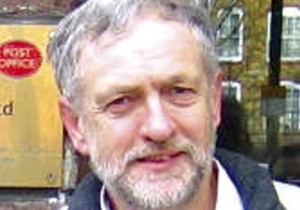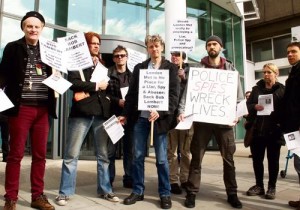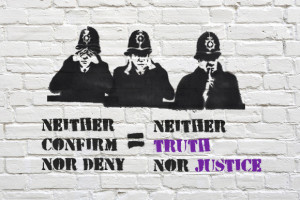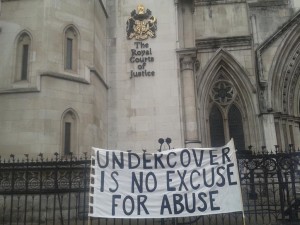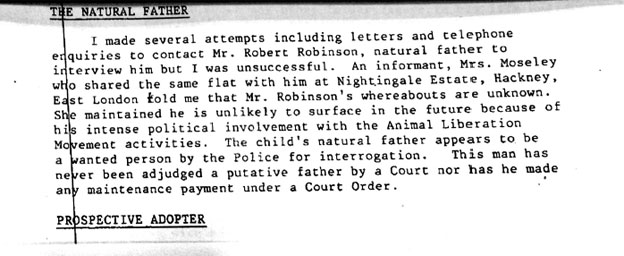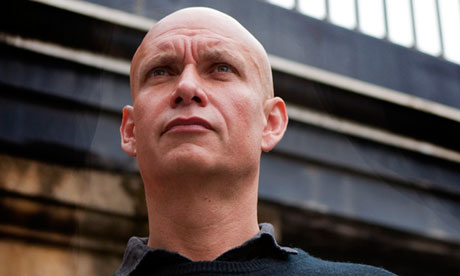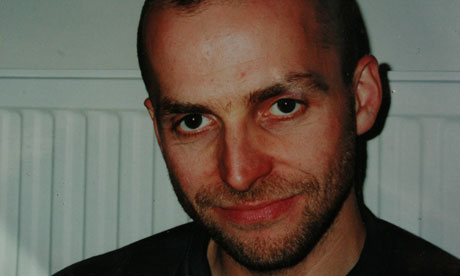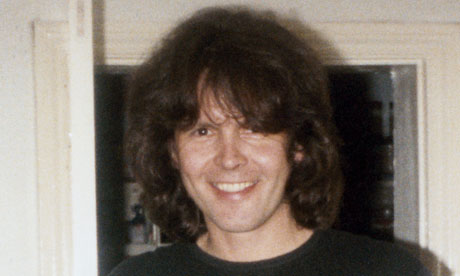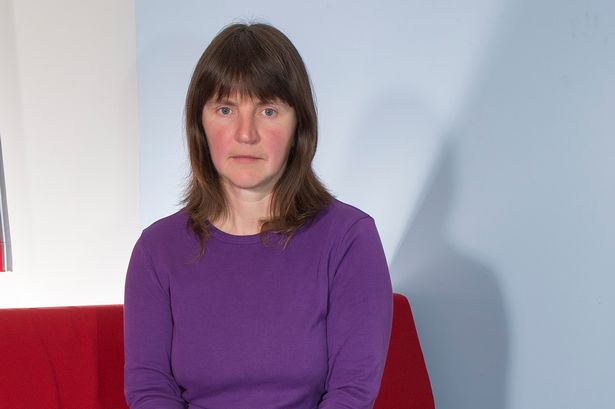Police Apology for Relationships: Where Next?
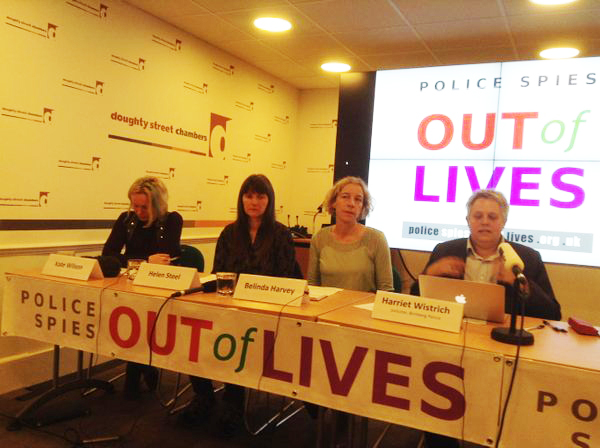
L-R: Kate Wilson, Helen Steel, Belinda Harvey and their lawyer Harriet Wistrich at their press conference, 20 November 2015
(Pic: Danny Shaw, BBC)
It’s an extraordinary statement by any standards. Even when the police pay large compensation, they usually do so with no admission of culpability for anything. But last Friday they issued a detailed, unreserved apology for the abuse of women who had relationships with undercover police officers.
Assistant Commissioner Martin Hewitt even made a video of the admission, bluntly stating for the record that the relationships were
abusive, deceitful, manipulative and wrong. I acknowledge that these relationships were a violation of the women’s human rights, an abuse of police power and caused significant trauma…
Most importantly, relationships like these should never have happened. They were wrong and were a gross violation of personal dignity and integrity.
The outrageousness and severity of how these women were treated is finally an acknowledged, settled fact.
MORE QUESTIONS THAN ANSWERS
Some of the harrowing, heart wrenching impacts were spelled out by Lisa Jones – partner of Mark Kennedy for six years and whose discovery of his true identity brought the issue to light – when she gave her first ever interview on Friday.
As “Rosa”, who had children with undercover officer Jim Boyling, said,
This has affected my whole view of the state and it went as deep as my womb
Kate Wilson’s description of what was done to her was similarly powerful, and her highlighting of the continuing lack of transparency – “the police have made no effort whatsoever to provide any kind of answers” – shows that all this is far from over.
It echoes what was said a year ago when the Met settled the first such case. Jacqui, who had a child with Bob Lambert, received £425,000 compensation but said
The legal case is finished but there is no closure for me. There is the money, but there is no admission by the police that what they did was wrong, there is no meaningful apology and most importantly there are no answers.
Although Friday’s apology is a major historic victory, it is only confirming that what the women already know to be true. There is so much more still hidden from view.
TIME TO TAKE CHARGE
The Met’s admission of their officers’ serious abuse must surely mean that the Crown Prosecution Service have to revisit last year’s extraordinary decision not to bring charges against these officers for sexual offences.
As Gayle Newland starts her eight year sentence for creating a false identity to deceive someone into a sexual relationship, it’s pretty clear that if this gang of men weren’t police officers they would already be behind bars. Nobody else would get away with just giving an apology and a cheque from public funds.
The CPS also decided not to prosecute them for other offences, explaining
In order to prosecute misconduct in public office, the prosecution would have to show that an officer knowingly abused their position in order to bring a sexual relationship about
It is hard to see how anyone could say anything else now. The Met have just conceded that the relationships didn’t just happen but
none of the women with whom the undercover officers had a relationship brought it on themselves. They were deceived pure and simple…. [it was] an abuse of police power
STRATEGIC INSTITUTIONAL SEXISM
But even now, the Met can’t quite admit the whole truth. They
accept that it may well have reflected attitudes towards women that should have no part in the culture of the Metropolitan Police
They still can’t bring themselves to use the word ‘sexism’. The Met is institutionally sexist as well as institutionally racist. This cannot ever change if they refuse to fully face the facts, and in this apology they just shied away once again.
Police say relationships were never authorised in advance and were never used tactically. But the overwhelming majority of known officers – all but two – did it. Most had long-term, committed life-partner relationships. One of them, Bob Lambert, lived with a woman and fathered a child before going on to run the unit, overseeing protegee officers who did the same thing, including ones involved in this week’s settlement. He must surely have known.
Sometimes officers were deployed together. Certainly, Lambert, Marco Jacobs and Lynn Watson saw colleagues having relationships. So, did they fail to report this ‘grossly unprofessional, never allowed’ behaviour to their seniors (thereby placing themselves at risk if they were ever found out)? Or did they report it but their bosses didn’t intervene? Or was it, as it appears, an established, accepted tactic?
PULLING BACK THE SHROUD OF SECRECY
Three years ago police lawyers said relationships weren’t authorised, trying to blame individual ‘rogue officers’ and shield managers from responsibility. But then it was pointed out that if this was unauthorised behaviour then it wasn’t covered by the rules governing surveillance in the Regulation of Investigatory Powers Act. If that were so then any case would be heard in open court instead of a secret tribunal where the womens’ side weren’t allowed. So those same lawyers went back to the same court and argued that relationships were actually authorised after all.
That was just one twist in the course of the four years and hundreds of thousands of taxpayers’ pounds police spent trying to stop these women bringing the facts to light. The blanket use of “Neither Confirm Nor Deny” to refuse to even admit anyone was a police officer was an additional insulting hurdle to make the path to truth more gruelling.
It’s a pattern familiar from so many other justice campaigns – there’s the injustice of what the police did, then the double injustice of the cover-up, smearing and legal obstacles that follow.
The apology statement rightly mentioned the extra distress caused by the protracted legal case and paid tribute to the tenacity and mettle of the women.
Even now, having just paid compensation and apologised to the women abused by John Dines and Mark Jenner, the police have not actually confirmed they were Special Demonstration Squad officers.
Nonetheless, the apology, like the agreement to be liable for damages paid to people spied on by Marco Jacobs, is effectively an admission that these men were police. It is another hammer blow to the devious, farcical tactic of Neither Conform Nor Deny. With the public inquiry still to come, that is significant.
A GRAIN OF TRUTH – TIME FOR THE HARVEST
All the appalling abuse these women suffered came from just five police officers. Even this isn’t the end of it – there are several other similar cases are still ongoing, including more partners of Mark Kennedy and Marco Jacobs.
We only know of the exposed officers due to the investigations and luck of activists and journalists. These are not necessrily the worst of them, merely what chance has revealed. There is so much more beyond. We have the names of around a dozen officers, less than 10% of those known to have worked undercover in the political secret police units.
How many other women were similarly abused? How many other children searching for their fathers are doomed to failure because it’s a name a police officer made up or stole from a dead child? How many campaigns were stymied? What other outrages have occurred that none of the known officers committed? At least 500 groups and uncountable thousands of individuals were spied on. They all have a right to know.
If these seven women deserve justice, so do the rest. If the public deserves the truth it deserves the whole truth, not somewhere under 10% of it.
Chair of the forthcoming public inquiry, Lord Pitchford, says
The Inquiry’s priority is to discover the truth
The only way we will get the truth is if those who were targeted tell their stories. The only way that can happen is if they know that their former friend and comrade was in fact a police spy. If the Inquiry is to serve its purpose, and if the Met are truly contrite, then they must publish the cover names of all undercover officers from the political policing units.



